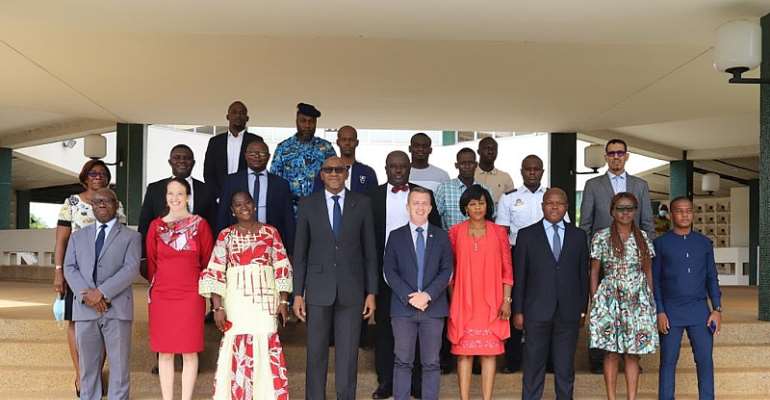ISMI holds five-day training course for fisheries inspectors from Gulf of Guinea countries

The International Maritime Institute (ISMI) of the Regional Academy of Maritime Sciences and Technology (ARSTM) in Abidjan, Cote d’Ivoire has this week held a training course for fishery inspectors from Gulf of Guinea countries.
The course which started on Monday, March 22 has seen fisheries inspectors, naval officers, and administrative agents in charge of fisheries, from 12 countries of the Gulf of Guinea arriving at the centre to participate.
The objective of the course is to strengthen the capacities of fisheries inspectors in the area of dockside monitoring of fisheries within the framework of the global fight against illegal, unreported and unregulated fishing (IUU fishing), in accordance with the resolutions of the summit of Heads of State and Government adopted in Yaoundé in 2013.
Over the years, IUU fishing has become a major problem that constitutes a global threat to sustainable fishing, the management, and conservation of fishery resources and marine biodiversity.
It is not only affecting healthy and productive ecosystems, but it also has a serious impact on the socio-economic situation of many fishing communities in the area and causes significant losses in terms of economic and social development.
While many are unaware of the turmoil in which the Gulf of Guinea finds itself, IUU Fishing according to research by experts has become the most serious threat to maritime security in the Gulf of Guinea, ahead of maritime piracy.
In a welcome address on the first day of the training course aiming to contribute to an effective response to the threat of IUU fishing, ARSTM Director-General Karim Coulibaly called on participants to support and be inspired by the results of the work of the seminar in order to prevent, counteract and eliminate illegal, unreported and unregulated fishing in our States.
“Given the stakes and the impact that bad practices have on our resources, you must take ownership of all the scientific and educational dimensions of this issue in order to provide our decision-makers with the appropriate resources to deal with IUU fishing effectively and efficiently,” he said.
Karim Coulibaly further expressed appreciation to the Regional Coordinator of the program, Col. Guillaume de Beauregard, collaborators, Mrs. Maylis TERTRAIS, Mr. Benoit VERNIQUET, as well as France and other partners.
In his address, the Regional Coordinator of the Support Programme for State Action at Sea, Guillaume Turquet of Beauregard stressed that the issue of IUU has become critical, leaving the Gulf in danger
According to him, states in the Gulf of Guinea must foster cooperation in order to identify useful synergies, promote information exchange, and create a network of knowledge beyond their borders.
He emphasized that the training course is of particular importance and must be treated with the utmost seriousness.
He said IUU fishing is a key factor that contributes to the strengthening of maritime insecurity in the region, hence the training and strengthening of the skills of fisheries inspectors is not a luxury, but a necessity that appears more urgent every day.
“Given the importance of the issues at stake, and the magnitude of the task ahead, there is no time to lose to embark on our enterprise…To all of you, I wish you a very good seminar, as well as a pleasant stay with us,” Guillaume Turquet of Beauregard concluded.
In all, 12 countries are represented at the training course expected to be concluded on Friday, March 26, 2021. They include participants from Benin, the Gambia, Gabon, Guinea, Liberia, Mauritania, Nigeria, Republic of Congo, Democratic Republic of Congo, Senegal, Togo, and of course Ivory Coast.
The seminar is organized with the financial and pedagogical support of France, a key partner of ISMI, through the program of support to the Action of the State at Sea in the countries of the Gulf of Guinea.
